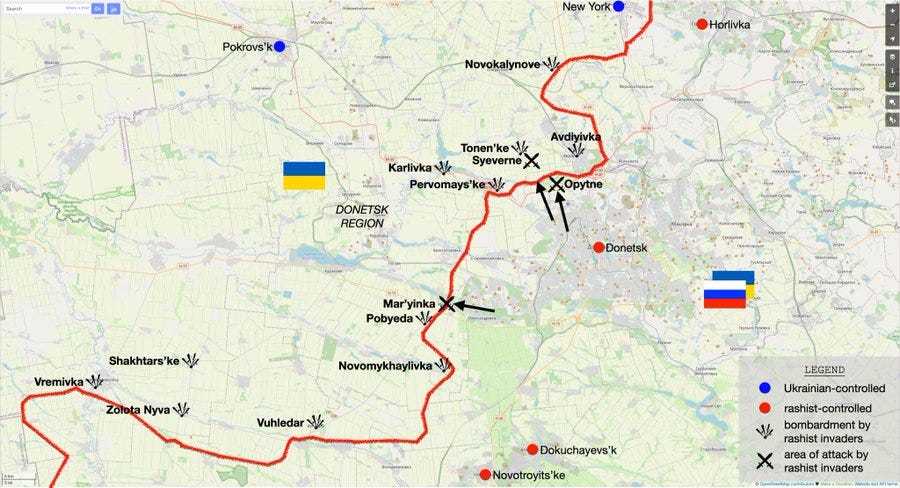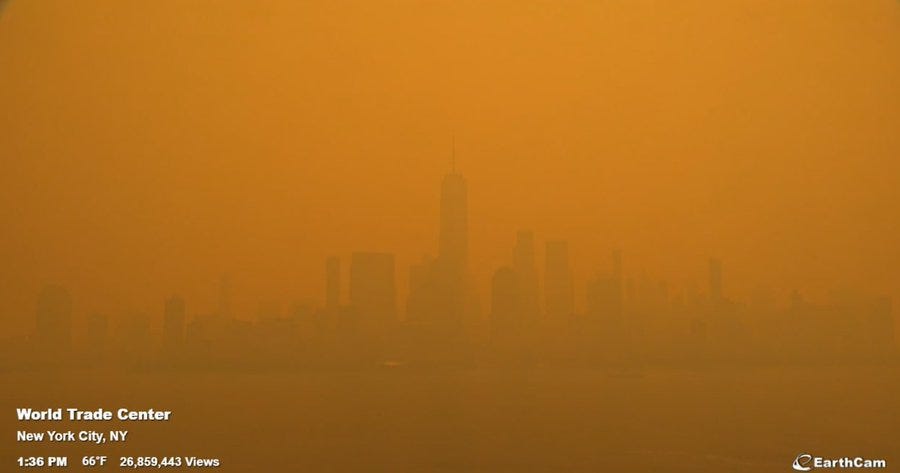Jun 9: E-Stories
Day 470: Kherson Kakhova Lyman Bakhmut RUdomestic NATO PolishFarmers Macron Raiko A&P Albania Davis MacKay UKDef Kenyon ForPolCanada Chu Berlinski Harms
Catching up…
EA Worldview’s Ukraine Up-date- hop over to Scott’s amazing hourly Ukraine up-date page. I’ll fill in with some bits and bobs.
Albania’s Permanent Representative to the UN absolutely wrecks Russia in front of a full room. He says the Russian Army clearly destroyed the Kakhovka dam and that there’s no point to listen to the Russians as they are a bunch of liars. “How many times have they lied”?
Stories we’re following…
President Zelensky said on Wednesday he was “shocked” at what he said was the failure of the United Nations and the Red Cross to provide help after the destruction of the massive Kakhovka dam. Although the catastrophe happened many hours ago, “they aren’t here”, Zelenskiy told German newspapers Bild and Die Welt and also Politico. “We have had no response. I am shocked”.
NYT: Experts point to deliberate explosion behind Kakhovka dam disaster. Engineering and munitions experts point to a deliberate explosion as the most logical reason behind the Kakhovka dam explosion, the New York Times reported on June 7.
Under the order of the Commander of the Russian grouping of forces "Dniepr," General Makarevich, the 1st Battalion of the 205th Separate Motorized Brigade of the 49th Army of the Southern Military District, committed another war crime.
Julia Davis: “Arguments broke out on the set of a Russian TV show when experts vehemently disagreed with the cover story about the destruction of the Nova Kakhovka dam. Bewildered hosts discovered that the only propagandist they could rely on was Tucker Carlson.”
Governor: 600 square kilometers of Kherson Oblast under water. According to Kherson Oblast Governor Oleksandr Prokudin, 68% of the flooded land is on the Russian-occupied east bank of the Dnipro River, and 32% is on the Ukrainian-controlled west bank. 1,894 people have been evacuated after the Kakhovka Dam explosion; three individuals are considered missing; 30 towns and villages remain in the flooded area, with 20 of them located in the occupied territory. In Kherson, 9 location points have been set up where residents can receive water, food supplies, and psychological support.
Igor Kuzin informed that bactericidal tablets and water disinfection supplies have been redistributed in Kherson and Mykolaiv Oblast. The supply of disinfection tablets should be sufficient to ensure the entire Kherson region is supplied for at least 1.5 months. This measure is taken to protect the population from outbreaks of waterborne infectious diseases associated with the use of contaminated drinking water.
Stefania Battistini reporting for RAI-1 News from Kherson. The city is submerged and aching but still alive. Stefania is with the rescue and relief efforts, and the volunteers who are checking on the river, and the Russians on the other side.
'The Kakhovka HPP was designed and built to withstand a nuclear strike from the outside. Therefore, any talk that it could somehow collapse by itself is pointless. This is out of the question', says Mykola Kalinin, chief engineer of Ukrhydroproject
The Guardian: “Despite the Kremlin’s rhetoric, what this episode suggests is that Russia is less interested in liberating Ukraine from its present leadership than it is in destroying its ability to function as a sovereign nation,” Birmingham academics Stefan Wolff and David Hastings Dunn wrote for The Conversation.
As the rescue operations were underway, Russia fired missiles on the collection points. There are no words to express the rage at this. There are many videos and photos that testify to this horrific, cruel act of barbarism.
Ukraine has launched an investigation "with the legal classification being ecocide and violation of the laws and customs of war," and provided preliminary information to the International Criminal Court in The Hague.
Times Radio: “They don’t necessarily have to use the area that was flooded.” Ukraine’s forces can still continue on their counter offensive as planned despite the destruction of a dam in Kherson which has caused significant flooding, says Scott Lucas.
Michael MacKay: “The cruelty of Russians knows no limit. They are capable of any crime against humanity. Ukrainians tried to leave their flooded homes in Kozachi Laheri in temporarily-occupied Kherson region. All evacuation routes were blocked by Russian armed militants, most of them drunk.”
In the town of Hola Prystan', the Russians drove residents of two-storey buildings out of their homes and took up occupancy. The terrorists set up firing positions on the rooves of these buildings. –General Staff of the Armed Forces of Ukraine report, 18:00, 7 June 2023
ISW: Destruction of Kakhovka dam 'significantly changing' Kherson front line. The flooding caused by the dam's destruction has "heavily disrupted" Russian defensive positions on the east bank of the Dnipro River, especially Russian first-line positions in Hola Prystan and Oleshky, the Institute of the Study of War said in its latest update.
The Russian forces are concentrating their main efforts on defensive operations on all fronts, attempting to complete the capture of Maryinka and locally improve its tactical position on the Lyman, Bakhmut, and Maryinka directions.
There have been 30 combat clashes in different directions: The Russians also lost some positions near Rozdolivka. Intense battles are taking place on the southwestern outskirts of Bakhmut.
Russian forces are withdrawing from flooded positions in Kherson Oblast.
The use of strike UAVs "Shakhed"/"Geran" fails to achieve the goal of wearing down the Ukrainian Armed Forces' air defense.
Sea: Russia plans to establish the Azov military-naval district in 2023, with bases in the temporarily occupied ports of Mariupol and Berdyansk in Ukraine.

Military: Ukrainian forces go on offensive near Bakhmut. Colonel General Oleksandr Syrskyi reported on June 7 that Ukrainian forces were advancing on flanks near Bakhmut and Russian forces were losing ground.
A fire broke out at the Kraski Belogor’ya paint factory in the Russian city of Shebekino, Belgorod Oblast, as reported by Vyacheslav Gladkov, Governor of Belgorod Oblast; local Telegram channel Zhest Belgorod. At the same time, Gladkov said that Shebekino was fired at from Grad multiple-launch rocket systems.
Health Ministry: Thousands of fish have died in Dnipropetrovsk Oblast. Tens of thousands of fish have died in Dnipropetrovsk Oblast after Russia's destruction of the Kakhovka dam the day before, the Health Ministry reported on June 7.
According to information received from the resistance movement network at the TOT of Ukraine, the occupation administrations continues measures aimed at the integration of the occupied territories into the social and political space of the Russian Federation. In particular, the opening ceremony of the regional branches of the Russian state fund “Defenders of the Fatherland” whose activities are aimed at supporting and encouraging the temporarily occupied territories residents to participate in the “SVO”, took place at the TOT of Donetsk, Zaporizhzhia, as well as Kherson regions.
The Russian Ministry of Internal Affairs has prepared an order to ban driving cars for people who did not appear at the military registration and enlistment office. The ban on driving in case of failure to appear at the military registration and enlistment office is provided for by a law adopted by the State Duma in April.
Against the backdrop of growing problems with the budget, which lost every second ruble of raw material revenues, the Russian authorities "cut" the financing of the national health care system. In the first quarter, the Russian regions, which pay more than half of the costs of polyclinics and hospitals across the country, reduced their spending on medicine by 10%, experts at the Gaidar Institute calculated.
Russian intelligence agencies are trying to jam the GPS signal not only in the center of Moscow to protect the Kremlin from enemy drones and missiles - jammers have affected the operation of airlines in Finland and the Baltic countries, because of this, air carriers have had to use alternative methods of navigation, reports Bloomberg. The source of the radio interference appears to be in the Leningrad region and has affected air travel, but GPS is available on the ground, the Estonian consumer protection agency said.
Ukraine wants to produce NATO-standard 155 mm shells. Ukraine's state-owned military enterprise Ukroboronprom is attempting to begin production of the 155 mm artillery shells, the company's spokesperson Natalia Sad said.
Guardian: Some NATO members may consider sending troops to Ukraine, warns former alliance chief. Some NATO countries may decide to put troops on the ground in Ukraine if its member states fail to provide Kyiv with meaningful security guarantees at the alliance's summit in Vilnius, former NATO security general Anders Rasmussen said on June 7.
Germany transferred another batch of military aid to Ukraine, which includes eight Bandvagn 206 tracked all-terrain vehicles, thousands of ammunitions for Gepard self-propelled anti-aircraft guns, fourteen Vector reconnaissance drones, fourteen protected border guard vehicles, and three drone detection systems.
Polish farmers block trucks at Ukraine border crossing. Polish farmers blocked the movement of trucks from Ukraine at the Medyka-Shehyni border crossing, demanding increased support from Warsaw for the domestic agricultural sector, Ukraine's State Border Guard Service announced on June 7.
NYT: Federal prosecutors told Donald Trump that he was a target of the classified documents inquiry, the clearest sign yet that he could face charges. It was unclear precisely when Mr. Trump and his lawyers were told that he was a target of the special counsel’s investigation, but the notice suggested that prosecutors were moving toward bringing an indictment.
Foreign Policy Canada: Russia accuses the West of “cancelling” Russian perspectives, but the only one attacking independent media and free speech is the Kremlin itself.
Nato must discuss options for giving Ukraine security assurances for the time after its war with Russia, the alliance’s chief Jens Stoltenberg said on Wednesday. When the war ends, Nato will need arrangements in place to ensure that Russia does not simply relocate its forces for another attack, he told reporters at an event in Brussels.
President Zelensky had a "substantial telephone conversation" with French president, Emmanuel Macron. Zelensky said:
I spoke about the agreement with the IAEA and Rafael Grossi to tighten control at the ZNPP. We agreed to continue defense cooperation, including the protection of our skies. We expect the early start of training of Ukrainian pilots. We discussed the formats of security guarantees for Ukraine, expectations from the Vilnius NATO summit and preparations for the global peace summit.
The home of famed Ukrainian painter Polina Raiko is under water as a result of the Kakhovka dam destruction, the project manager of the Polina Raiko Kherson Oblast Charitable Foundation Semen Khramtsov reported on Facebook.
Tens of millions of people in North America have been warned of dangerous air quality as intense wildfires rage across Canada. Public health officials have cautioned people not to exercise outside and to minimise exposure to the smoke as much as possible
Claire Berlinski, The Flood-Russia floods Ukraine, and Tankies flood Twitter
I didn’t put a paywall on this. (Sometimes I write things to earn a living; sometimes I do it because I can't do anything else.) I’m incandescent with rage and nauseated with disgust—and not just with the (serial) perpetrators of what is in effect a WMD attack, but with the demented goblins in the West who are capable of gazing upon this suffering and announcing that surely, Ukrainians must have done it to themselves.
Shame on them. Shame. Shame.
Read Claire Berlinski’s article here.
Lenora Chu, In Germany’s east, a hard rethink of relations with once-close Russia
One of the most widely distributed Russian novels of all time was required school reading for a young Katja Hoyer.
Growing up in East Germany, Ms. Hoyer remembers being impressed by the heroic protagonist of “How the Steel Was Tempered.” The Russian main character, Pavel, was maimed while fighting for the Bolsheviks, and the forging of his character into figurative steel while serving the communists was a “classic Russian socialist novel. You read in Russian about a Russian who’s going through a tough time in their lives,” recalls Ms. Hoyer. It made an impression, as it did on many of her fellow East German schoolmates at the time.
Ms. Hoyer was 4 when the Berlin Wall fell, and Germany was unified into the young republic it is today. Today, the east-west geographical divide in Germany is seen in museum exhibits, but also in the familiarity with all things Russian – including the language, culture, and people – of eastern Germans of a certain age.
“Many East Germans don’t see Russians as ‘one block of people who follow Putin,’” explains Ms. Hoyer, who recalls visiting St. Petersburg as a girl on a publicly funded trip. “It makes Russians real people as opposed to faceless enemies – it’s more difficult to see people you actually know as enemies.” [continue]












